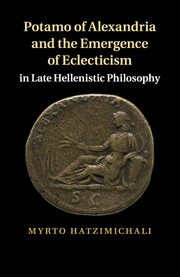Book contents
- Frontmatter
- Contents
- Acknowledgements
- Abbreviations
- Introduction
- Chapter 1 Eclecticism in modern and ancient thought
- Chapter 2 Eclecticism and Alexandria in the first century bc
- Chapter 3 Potamo of Alexandria, life and work
- Chapter 4 The eclectic system of Potamo's Elementary Teaching
- Chapter 5 Potamo and Aristotle's On the Heavens
- Chapter 6 Further references to Potamo
- Chapter 7 Conclusions
- Bibliography
- General index
- Index of passages cited
Chapter 5 - Potamo and Aristotle's On the Heavens
Published online by Cambridge University Press: 05 July 2011
- Frontmatter
- Contents
- Acknowledgements
- Abbreviations
- Introduction
- Chapter 1 Eclecticism in modern and ancient thought
- Chapter 2 Eclecticism and Alexandria in the first century bc
- Chapter 3 Potamo of Alexandria, life and work
- Chapter 4 The eclectic system of Potamo's Elementary Teaching
- Chapter 5 Potamo and Aristotle's On the Heavens
- Chapter 6 Further references to Potamo
- Chapter 7 Conclusions
- Bibliography
- General index
- Index of passages cited
Summary
There are two references to Potamo in Simplicius’ commentary on Aristotle's On the Heavens. Both come from his comments on the third book of the work, which contains Aristotle's discussion of the earthly elements, their number and properties, and is dominated by a critique of earlier theories. The first reference to Potamo is part of Simplicius’ discussion of Aristotle's views on the number of elements. Aristotle introduces the topic as follows: πότερον δὲ πεπερασμένα ἢ ἄπειρα, καὶ εἰ πεπερασμένα, πόσα τὸν ἀριθμόν, ἑπόμενον ἂν εἴη σκοπεῖν (‘the next thing would be to examine whether they are limited or infinite, and if they are limited, how many in number’, Cael. 3.4.302b10–11). More specifically, Potamo's intervention is related to the criticism of the view Aristotle ascribes to Anaxagoras, namely that there is an infinite number of entities, divisible into parts that are the same as each other and the whole (ὁμοιομερῆ), which Aristotle treats as equivalent to his elements. He argues that even on Anaxagoras’ view one need not postulate an infinite number:
- Type
- Chapter
- Information
- Potamo of Alexandria and the Emergence of Eclecticism in Late Hellenistic Philosophy , pp. 140 - 162Publisher: Cambridge University PressPrint publication year: 2011



